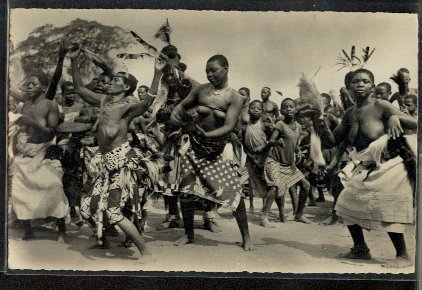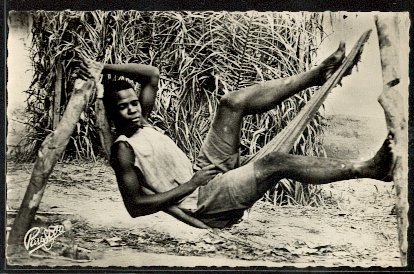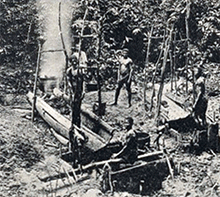go back... - or - Download a pdf - or - Next Article

 MISSION WORK ON THE CONGO
MISSION WORK ON THE CONGO
Dr. Snyder Tells of His Labors Among the Bakete
He Has Made Sixty Converts.
At First the Natives Were Indifferent to Missionary Teaching; Afterward They Became Inquisitive and Eventually a
Number Willing Embraced Christianity. A Collection of Curious Implements and Ornaments Exhibited.
There are probably fifteen of these steamers in use on the Congo. Our route continued up the Congo to the mouth of the
Kassava River. On the latter stream we traveled 600 miles to Luebo, 1,00 miles from the coast, the station of the American
Presbyterian Congo Mission which was established five years ago by the Rev. S.N. Lapsley and Rev. W. H. Shepard, the later
a Negro, and both southerners. The mission was reinforced in 1892 by six new workers, including my wife and myself.
In 1893, death claimed one and ill health compelled the return of the others so that my wife and I were left alone.
The Bakete among whom we worked received us very kindly, but were opposed to our teachings. Complete indifference was
displayed at first, and this was followed by inquisitiveness and later by acceptance of the gospel. And during the
last year and a half we made sixty convert, who are doing excellent work among their own people. We have a chapel and
a seating capacity of 100 and services and Sunday school are being held every Sabbath. In addition we conduct
a day school, which is getting along very well. The dialect of the natives is Bantu and parts of the Bible and several
hymns have been translated into that tongue. The people are below medium height, chocolate colored, with Caucasian features
and uncommonly prepossessing in appearance. They are skillful and posses imitative qualities, but not much inventive power
or originality. They claim that their knowledge of weaving, mining and other pursuits have been handed down from father to
son and that is all they know about it. The women are industrial and do all the husbandry and farming work. They make good
farmers. The men do the sewing, make the clothes, manufacture the various instruments and implements in use and prepare
palm wine. Their practical food is cassava or manioc,
which is similar to arrowroot. This plant has a long tuberous root and when dug up it is placed in a running stream of
water and left until it begins to decompose. It is then taken to the homes of the natives and placed in a loft and
subjected to smoke and heat from the open fires. When dried it is ready for use and will keep any length of time.
To prepare it for food it is ground into a fine powder in a mortar, mixed with boiling water until it begins to swell
like other starchy foods and is then eaten with palm oil and the tender green leaves of the palm itself. The missionaries
use the cassava as a substitute for potatoes, but prepare it differently from the natives. The flesh of the goats and
chickens is the only meat to be had in that part of the country.
There are no marriage laws among the Bakete. Women are considered as property and bought and sold. A man's wealth is
estimated by the number of wives he has and a woman may be purchased for ten goats. As goats are worth about $1.50 apiece,
a wife costs $15. Their houses are very neat made from sticks covered with palm mats and consist of but one room. For
each wife a man will have a separate house and when a native has a number of houses he fences them in and has a little
world of his own. The tribe is governed by a king, but each village or town has it's own chief. The office is hereditary,
but unlike most countries, the succession is from uncle to Nephew instead from father to son. As long as the ruling chief
lives, his son is accorded all the honors of a crown prince. But when he dies his nephew succeeds him. The same law
applies to the medicine man.
In the case of a non payment of a debt the creditor may refer the matter to the members of the town council, who then
assemble and hear both sides.
|
If the prisoner is found guilty the chief, who acts as court officer, is instructed to
place the muadi, which consists of a stick with leaves of the palm leaf hanging from it, over the door of the debtor's
house.
While the muadi hangs over the door no woman is allowed, under the most sever penalty, to enter and the debtor
unable to obtain any food is starved into settling the claim.
They believe, in a way, in God. But for the most part theirs is the fetish worship common to all the African tribes.
They believe that after death the spirit goes to Mputa, which would correspond to a foreign country with is and that it
may remain in this country or return to a woman and be born again. The spirit may return to any woman or any country.
The only attempt at religious rites is that practiced by the medicine man. In each town there are a certain number of
medicine men, or witch doctors, but the medicine men of a town have no right to make medicine for their own town.
Once in five years
strong medicine is made. The doctors gather outside the town and hold a palaver as to the price to charge for making
medicine, and after long haggling agree on a sum. They enter the town and command that houses or open sheds be built
for their accommodation and announce their intension of making medicine.
The people are instructed that on the next day they must not leave their houses until noon and the injunction is
implicitly obeyed. Early in the morning the medicine men go into the woods and surrounding a tree that they know
to be a medicine tree, speak to it thus; O tree, we want medicine from you. We want good strong medicine.
After having partaken of this medicine any one who shall steal commit murder, lie, ,or do any worn let him die.
The last word is repeated three times. The medicine men take the bark from the tree, grind it into powder,
and mixing it with
palm oil make it into balls the size of a chestnut. Returning to town they enter the huts prepared for them,
summon the people and administer the medicine, repeating the words addressed to the tree regarding the penalty
for wrong doing after having taken the medicine. The natives thoroughly believe in the power of the medicine men.
The amusements of the people consist of dancing and gambling, a kind of dice throwing being the game of chance. They are fond of music and their instruments, while discordant and harsh nearby, do not sound so unmusical at a little distance. They dance to sort of castanet music. On parade days and holidays they are dresses in fancifully woven cloths with ornaments of beads and feathers, but ordinarily the men and women are very sparsely clothed and the children are always nude. The chiefs wear hats made of hair at the back and fastened with a lone hatpin. Except for this tuft the head is clean shaven. The only means of transportation is to be carried on a hammock.
The tribes in the region of our mission are for the most part peaceful and whether they accept the teachings of the missionary or not, he is always regarded as their friend. There is rarely much danger from the wild animals. The climate is either very dry and warm or else rainy and malarial fever and other complications are common. The Bakete are philosophical and they are quite content with themselves and their ways. Occasionally the men indulge heavily in palm wine, but I never saw one of them in a staggering state.
The natives mine copper and iron is also found in the bed s of the river. They understand working in charcoal and this get a carbonized iron, which they make into various instruments and implements. They have forges, with primitive sort of anvil and hammer and use a double bellows. In weaving cloth, which is made from the shredded bark of the pine tree, they have an instrument corresponding to our old fashion loom, and make excellent thread and cord, as cotton grows wild. Their bead work is equal to that of the Indians and as shells and beads are the coins, some of the belt and ornaments represent considerable outlay. The men do this work and take a long time about it. At the conclusion of his talk Dr. Snyder exhibited and explained the use of a very interesting collection of souvenirs. Battle axes and hammers were side by side with hat pins that are very similar to the style now in general use; hair ornaments that resembled the bargain counter variety and pocketbooks and belts attached, made of feathers and beads that would be in line with the popular fancy to-day. The pillow used by the natives is in a T shaped piece of wood, about three inches high and the bed consists of a mat. Anklets of many coils of copper wire, queer looking instruments for producing music, knives of copper and iron, drums, hats of palm fiber and fancy feathers, with up to date hat boxes, pestles, mortars, images and charms, together with specimens of the rubber in crude state were among the articles exhibited. The specimens of weaving were remarkable. A piece of patchwork in half inch square boxes was one f the most interesting bits and the samples of fancy cloth were admired. Dr Snyder has compiled the first dictionary and grammar in the Bantu dialect and is preparing a primer for use in the mission school. There are twenty-one letters in the alphabet. The language is not very difficult of acquirement as it consist of a series of alliterative concords. Dr Snyder will remain for a few days in then starts for the South. He expects to return to the mission after a few months' vacation.
|
| Would you like to go back... or return to home page? click here. |
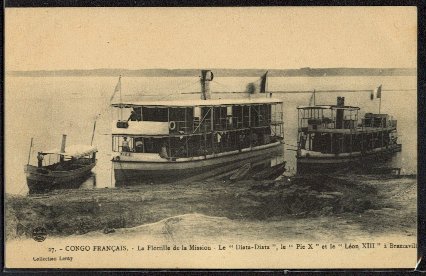
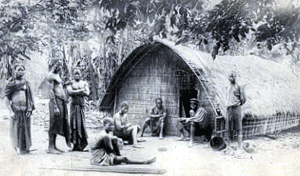
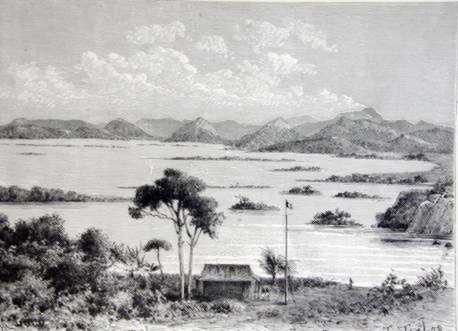 Stanely Pool - Hand drawn View from Brazzaville
Stanely Pool - Hand drawn View from Brazzaville
